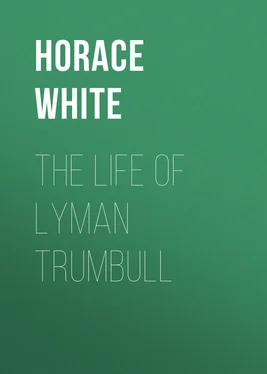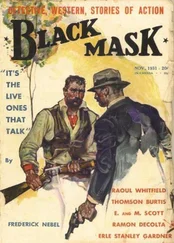Horace White - The Life of Lyman Trumbull
Здесь есть возможность читать онлайн «Horace White - The Life of Lyman Trumbull» — ознакомительный отрывок электронной книги совершенно бесплатно, а после прочтения отрывка купить полную версию. В некоторых случаях можно слушать аудио, скачать через торрент в формате fb2 и присутствует краткое содержание. Жанр: foreign_prose, История, foreign_edu, foreign_antique, на английском языке. Описание произведения, (предисловие) а так же отзывы посетителей доступны на портале библиотеки ЛибКат.
- Название:The Life of Lyman Trumbull
- Автор:
- Жанр:
- Год:неизвестен
- ISBN:нет данных
- Рейтинг книги:5 / 5. Голосов: 1
-
Избранное:Добавить в избранное
- Отзывы:
-
Ваша оценка:
- 100
- 1
- 2
- 3
- 4
- 5
The Life of Lyman Trumbull: краткое содержание, описание и аннотация
Предлагаем к чтению аннотацию, описание, краткое содержание или предисловие (зависит от того, что написал сам автор книги «The Life of Lyman Trumbull»). Если вы не нашли необходимую информацию о книге — напишите в комментариях, мы постараемся отыскать её.
The Life of Lyman Trumbull — читать онлайн ознакомительный отрывок
Ниже представлен текст книги, разбитый по страницам. Система сохранения места последней прочитанной страницы, позволяет с удобством читать онлайн бесплатно книгу «The Life of Lyman Trumbull», без необходимости каждый раз заново искать на чём Вы остановились. Поставьте закладку, и сможете в любой момент перейти на страницу, на которой закончили чтение.
Интервал:
Закладка:
In the South the pecuniary interests bottomed on slavery offset and neutralized the unifying process that was ripening in the North. The slavery question entered into the debate between Webster and Calhoun in 1833 sufficiently to show that it lay underneath the other questions discussed. Calhoun, in the speech referred to, reproached Forsyth, of Georgia, for dullness in not seeing how state rights and slavery were dovetailed together and how the latter depended on the former.
That African slavery was the most direful curse that ever afflicted any civilized country may now be safely affirmed. It had its beginning in our country in the year 1619 at Jamestown, Virginia, where a Dutch warship short of provisions exchanged fourteen negroes for a supply thereof. Slavery of both Indians and negroes already existed in the West Indies and was regarded with favor by the colonists and their home governments. It began in Massachusetts in 1637 as a consequence of hostilities with the aborigines, the slaves being captives taken in war. They were looked upon by the whites as heathen and were treated according to precedents found in the Old Testament for dealing with the enemies of Jehovah. In order that they might not escape from servitude they were sent to the West Indies to be exchanged for negroes, and this slave trade was not restricted to captives taken in war, but was applied to any red men who could be safely seized and shipped away.
From these small beginnings slavery spread over all the colonies from Massachusetts to Georgia and lasted in all of them for a century and a half, i.e., until after the close of the Revolutionary War. Then it began to lose ground in the Northern States. Public sentiment turned against it in Massachusetts, but all attempts to abolish it there by act of the legislature failed. Its death-blow was given by a judicial decision in 1783 in a case where a master was prosecuted, convicted, and fined forty shillings for beating a slave. 4 4 G. H. Moore's History of Slavery in Massachusetts , p. 215.
Public opinion sustained this judgment, although there had been no change in the law since the time when the Pequot Indians were sent by shiploads to the Bermudas to be exchanged for negroes. If masters could not punish their slaves in their discretion,—if slaves had any rights which white men were bound to respect,—slavery was virtually dead. No law could kill it more effectually.
In one way and another the emancipation movement extended southward to and including Pennsylvania in the later years of the eighteenth century. Nearly all the statesmen of the Revolution looked upon the institution with disfavor and desired its extinction. Thomas Jefferson favored gradual emancipation in Virginia, to be coupled with deportation of the emancipated blacks, because he feared trouble if the two races were placed upon an equality in the then slaveholding states. He labored to prevent the extension of slavery into the new territories, and he very nearly succeeded. In the year 1784 he reported an ordinance in the Congress of the Confederation to organize all the unoccupied territory, both north and south of the Ohio River, in ten subdivisions, in all of which slavery should be forever prohibited, and this ordinance failed of adoption by only one vote. Six states voted in the affirmative. Seven were necessary. Only one representative of New Jersey happened to be present, whereas two was the smallest number that could cast the vote of any state. If one other member from New Jersey had been there, the Jeffersonian ordinance of 1784 would have passed; slavery would have been restricted to the seaboard states which it then occupied, and would never have drawn the sword against the Union, and the Civil War would not have taken place. 5 5 Jefferson was cut to the heart by this failure. Commenting on an article entitled "États Unis" in the Encylopédie , written by M. de Meusnier, referring to his proposed anti-slavery ordinance, he said: "The voice of a single individual of the State which was divided, or one of those which were of the negative, would have prevented this abominable crime from spreading itself over the new country. Thus we see the fate of millions unborn hanging on the tongue of one man, and Heaven was silent in that awful moment."
After the emancipation movement came to a pause, at the southern border of Pennsylvania, the fact became apparent that there was a dividing line between free states and slave states, and a feeling grew up in both sections that neither of them ought to acquire a preponderance of power and mastery over the other. The slavery question was not concerned with this dispute, but a habit grew up of admitting new states to the Union in pairs, in order to maintain a balance of power in the national Senate. Thus Kentucky and Vermont offset each other, then Tennessee and Ohio, then Louisiana and Indiana, then Mississippi and Illinois.
In 1819, Alabama, a new slave state, was admitted to the Union and there was no new free state to balance it. The Territory of Missouri, in which slavery existed, was applying for admission also. While Congress was considering the Missouri bill, Mr. Tallmadge, of New York, with a view of preserving the balance of power, offered an amendment providing for the gradual emancipation of slaves in the proposed state, and prohibiting the introduction of additional slaves. This amendment was adopted by the House by a sectional vote, nearly all the Northern members voting for it and the Southern ones against it, but it was rejected by the Senate.
In the following year the Missouri question came up afresh, and Senator Thomas, of Illinois, proposed, as a compromise, that Missouri should be admitted to the Union with slavery, but that in all the remaining territory north of 36 degrees and 30 minutes north latitude, slavery should be forever prohibited. This amendment was adopted in the Senate by 24 to 20, and in the House by 90 to 87. Of the affirmative votes in the House only fourteen were from the North, and nearly all of these fourteen members became so unpopular at home that they lost their seats in the next election. The Missouri Compromise was generally considered a victory for the South, but one great Southerner considered it the death-knell of the Union. Thomas Jefferson was still living, at the age of seventy-seven. He saw what this sectional rift portended, and he wrote to John Holmes, one of his correspondents, under date of April 22, 1820:
This momentous question, like a fire-bell in the night, awakened me and filled me with terror. I considered it at once as the knell of the Union. It is hushed, indeed, for the moment. But this is a reprieve only, not a final sentence. A geographical line, coinciding with a marked principle, moral and political, once conceived and held up to the angry passions of men, will never be obliterated, and every new irritation will mark it deeper and deeper.
Nearly all of the emancipationists, during the decade following the adoption of the Compromise, were in the slaveholding states, since the evil had its seat there. The Colonization Society's headquarters were in Washington City. Its president, Bushrod Washington, was a Virginian, and James Madison, Henry Clay, and John Randolph, leading Southerners, were its active supporters. The only newspaper devoted specially to the cause (the Genius of Universal Emancipation ), edited by Benjamin Lundy and William Lloyd Garrison, was published in the city of Baltimore. This paper was started in 1829, but it was short-lived. Mr. Garrison soon perceived that colonization, depending upon voluntary emancipation alone, would never bring slavery to an end, since emancipation was doubtful and sporadic, while the natural increase of slaves was certain and vastly greater than their possible deportation. For this reason he began to advocate emancipation without regard to colonization. This policy was so unpopular in Maryland and Virginia that his subscription list fell nearly to zero, and this compelled the discontinuance of the paper and his removal to another sphere of activity. He returned to his native state, Massachusetts, and there started another newspaper, entitled the Liberator , in 1831. The first anti-slavery crusade in the North thus had its beginning. It did not take the form of a political party. It was an agitation, an awakening of the public conscience. Its tocsin was immediate emancipation, as opposed to emancipation conditioned upon deportation.
Читать дальшеИнтервал:
Закладка:
Похожие книги на «The Life of Lyman Trumbull»
Представляем Вашему вниманию похожие книги на «The Life of Lyman Trumbull» списком для выбора. Мы отобрали схожую по названию и смыслу литературу в надежде предоставить читателям больше вариантов отыскать новые, интересные, ещё непрочитанные произведения.
Обсуждение, отзывы о книге «The Life of Lyman Trumbull» и просто собственные мнения читателей. Оставьте ваши комментарии, напишите, что Вы думаете о произведении, его смысле или главных героях. Укажите что конкретно понравилось, а что нет, и почему Вы так считаете.












